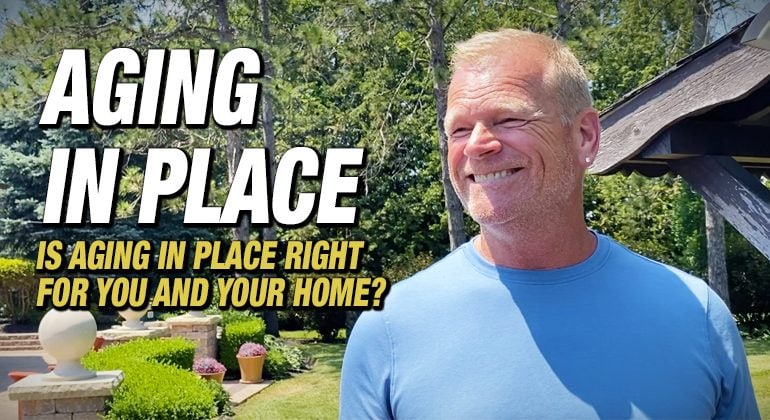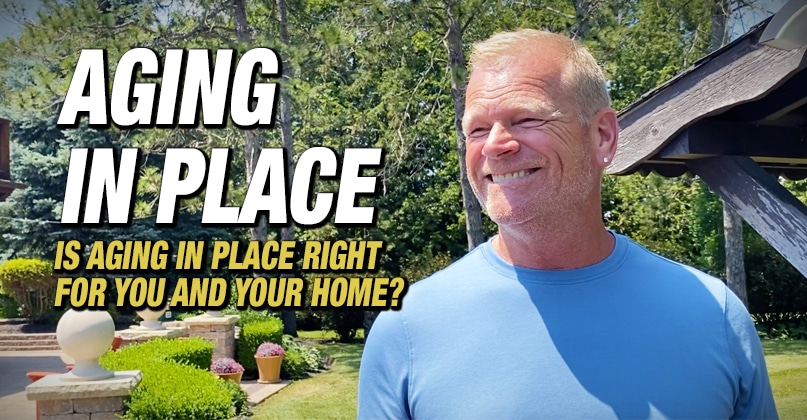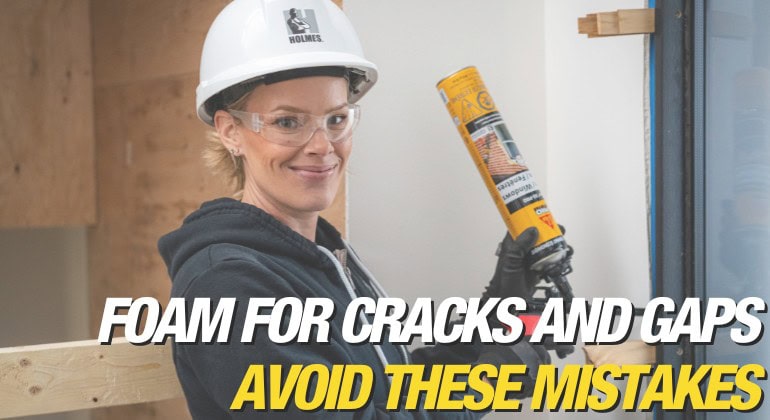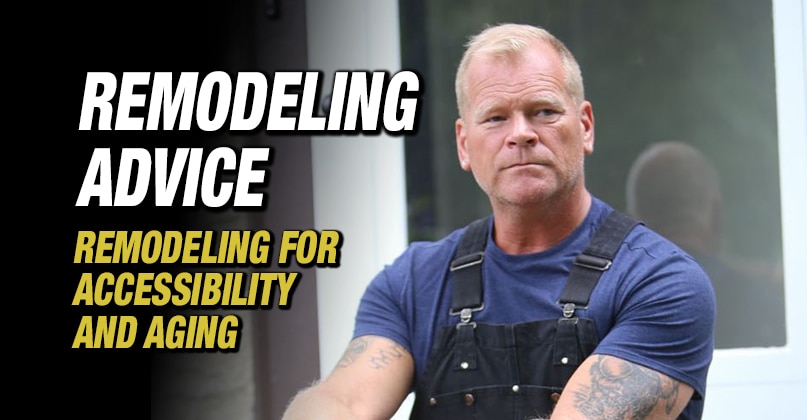I think custom kitchen cabinets are a great investment—but only if you do it right, the first time. Whether you’re renovating your forever home or boosting your home’s resale value,...

Is Aging in Place Right for You and Your Home?
By Mike Holmes
Mike’s Advice / Bathroom Renovation
Wednesday, May 7th, 2025 @ 11:28am
A theme that is coming up a lot in my jobs is how to safely age in place.
One big question to ask about your home is this: do I want my current home to be my forever home? If so, here are some questions you might have about aging in place.
Is Aging In Place The Best Option For Seniors?
The answer to this depends on a lot of factors.
- How is your general health?
- How is your mobility?
- Does your current home have a lot of stairs?
- What about a big yard to care for?
- Do you have any interest in keeping your home, or downsizing to a smaller condo or assisted living?
There are pros and cons for each option, but for many homeowners, staying in the home where they raised their family is a source of pride. If your plan is to stay in the house for as long as possible, here are some tips to making it possible.
How Can I Age In Place?
What’s the key to aging in place? Being proactive. If you want your home to be a forever home, the most important thing to do is make upgrades throughout the years that will facilitate you as you age.
The principle is called universal design, and it’s about creating a home that can seamlessly transition with you as you get older. This means you’re not having to consistently make changes to account for your ‘new normal’ as you age.
What Is The Best Type Of Home For Aging In Place?
To me, the best style of home for aging in place is a bungalow. You can keep your main living areas (bathroom, bedroom, kitchen, living space) situated on one level. Your basement can be left as a space for your mechanical room and your laundry (though you could also add a main floor laundry, to keep you from going up and down the stairs as much).
If you want your home to be a forever home, the most important thing to do is make upgrades throughout the years that will facilitate you as you age.
Make Smart Upgrades to Entryways
What other kinds of additions does your home need to maintain a universal design? Subtle things, like creating a no-step entryway for your front door. If you need to navigate your home using a wheelchair or a walker, one single step can be what keeps you from entering your home comfortably.
It’s also worth looking at your front door hardware. A smart lock is one of the easiest and most effective upgrades you can make—especially one from a trusted brand like Schlage. The Schlage Encode Plus and Schlage Encode Lever are great options that let you lock and unlock your door with a simple four-digit code instead of a traditional key. That’s a big help if you have arthritis or limited hand mobility.

If you experience a fall or medical issue and someone needs to enter the home, having a code or remote access makes that faster and easier than searching for a key. We install Schlage smart locks on almost all of our projects!
You can give trusted family members or caregivers their own codes, so they can come and go without needing a key—and you’ll get alerts when someone enters or leaves. If you’re away from home, you can even unlock the door remotely using your smartphone. That kind of access and peace of mind is hard to beat.
With features like auto-lock/unlock, voice assistant compatibility, and backup battery options, Schlage smart locks offer convenience without sacrificing security. And with sleek designs that blend into any style of home, they’re a simple way to stay connected, secure, and independent as you age in place.
Make Your Landscaping Work For You
Don’t forget about the back entrance. In case of emergency, you need to be able to exit your home via any door necessary, so they all must be accessible. Entrances should also be, at minimum, 36 inches wide.
READ NEXT:
Upgrades To Your Bathroom
Bathrooms can be tricky to navigate if you’re making use of mobility devices. But floating shelves and vanities can create extra space. Many bathrooms may be too small to accommodate most mobile devices (spanning about five feet by eight feet).
READ NEXT:
When Do You Know It’s Time For Assisted Living?
This is a tough decision for any family to make. Sometimes, even with the best of preparations, a slip and fall, failing health, or any number of factors can come in to play that make it difficult for older adults to live on their own without extra care.
Generally, has the house become too much to manage? Are you able to handle everyday tasks that come with the home like cooking, cleaning, and maintenance? Are you able to socialize with others? Depending on your finances, some of these tasks you could hire out for, but a lack of motivation to complete these tasks can be a signal that it’s time to move on from the property.
Ultimately it’s about care and quality of life. As a senior resident, are you able to get out of bed on your own? Can you bathe, dress, and feed yourself? Are you able to use the bathroom unassisted (even via grab bars)?
If you can handle most of these, odds are you can stay in the home. If you can only manage one or two, it’s probably time for a hard conversation with your doctor or family member about switching to a long term care situation.
Location Is An Important Consideration
Finally, one important consideration is the location of your home. I love my country house because of all the privacy it offers – but I chose a property that’s as close to a grocery store and hospital as possible. I know that I’m not ever more than five minutes away if I need something.
If I no longer had the ability to drive my truck, the house isn’t close to public transit, effectively cutting me off from my community. Location of the home is just as important as the structure. If you’re not easily able to access groceries, your health care provider, and other amenities, it’s the wrong property.
READ NEXT:









